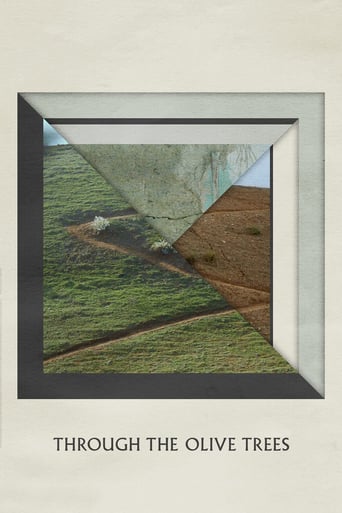Jackson Booth-Millard
I found this Iranian film in the book 1001 Movies You Must See Before You Die, it was an easy to remember title, but I didn't else about it, but critics gave it positive reviews, so I hoped it would be good, directed by Abbas Kiarostami (Taste of Cherry, The Wind Will Carry Us). Basically Hossein (Hossein Rezai) is a local stonemason who has become an actor, filming on location for the movie Zendegi Edame Darad (And Life Goes On). Outside the film set, Hossein makes a marriage proposal to his leading lady, a student named Tahereh (Tahereh Ladanian), she was orphaned by an earthquake. Hossein is poor and illiterate, because of this the girl's family are insulted by his proposal, and the girl avoids him as a result. Even during filming, she continues to evade him, she also seems to have trouble grasping the difference her role in the film and her real-life self. Things get more complicated as Hossein continues to pursue the affections of the young actress while the filming goes on, the Film Director (Mohamad Ali Keshavarz) learns about this and tries to advise him what to do. The girl manages to finish the scene while Hossein attempts to woo her, she departs, and Hossein runs after her. In the final scene, at a great distance, the girl finally gives an answer to Hossein, we are left with him running through a green field, and back through the olive trees, and we never know what the response is given by the girl. The documentary style of filming is interesting, the director pokes fun at the filmmaking process, with memorable take after take sequences of the lead actor going up and down a flight of stairs and messing up a line, this film blurs the lines between life and art, and it has some good sights of Iran's northlands, a reasonable drama. Worth watching!
Niv_Savariego
This film is a masterpiece, and can easily be seen and understood without the two previous films.It revolves around a scene in which Hussein, a very low-class, insecure person, has to play the groom of Taheren, the girl whom he loves in real life. The fictive scene in which they are married, and Hussein's dreams and hopes of marrying her, mesh together and develop as the film goes on. It's all very moving, sensitive, even mesmerizing.There is a constant reference to something or someone 'behind the trees,' perhaps a pointer at something beyond the film's scope and ability of description. In the end, the stubborn and proud Taheren also disappears behind the trees, and Hussein is left standing alone.A very sensitive and moving film. Hussein's character, always dreaming and fantasizing about things that cannot be, is touching and endearing. The issue of fiction vs. reality, imagination vs. real life, is dealt with great wisdom and subtlety. One of Kiarostami's best.
meleftheriou-1
I'd just like to disagree with those who suggest this film may not be accessible to people who have not seen the first two films in the trilogy. I haven't, but have not been as bewitched by a film since I saw Aggelopoulos' Travelling Players for the first time. My heart responded, the hairs on the back of my neck responded, my being responded. No matter if my brain wasn't fully au fait with what came before. Superb doesn't begin to cover it. How he captured these (non)performances from his actors is beyond me: perhaps, unfamiliar with the conventions of film-making, they were uniquely equipped to sidestep them.Michael
albyperez
I enjoy "art films" a lot, they usually may lack means but have great ideas behind, but this one was just poorly shot, had plenty of scenes in which nothing was happening (and then many others that were repeated again and again), it had no music, and then the last scene confirmed me that I had been completely cheated by an unskilled director (that tried to make his flaws as virtues) and by some snobbish critics.

